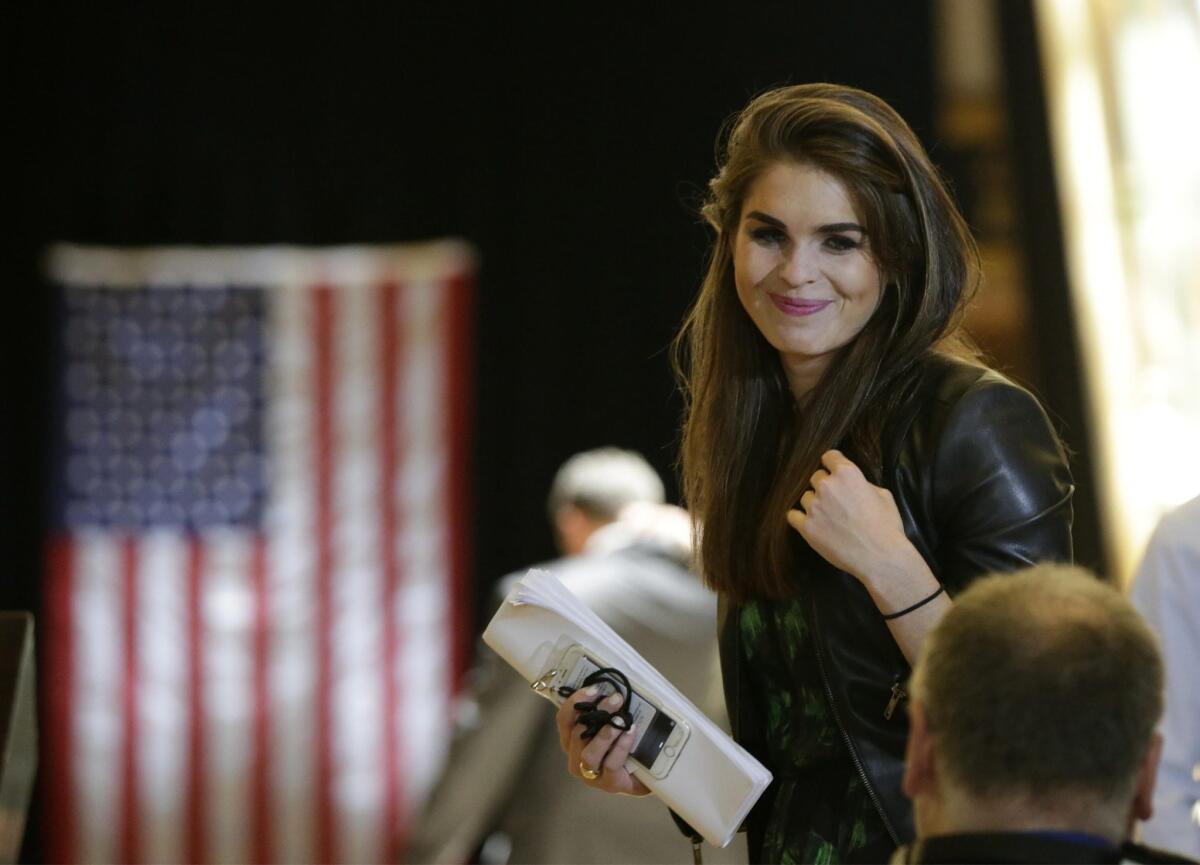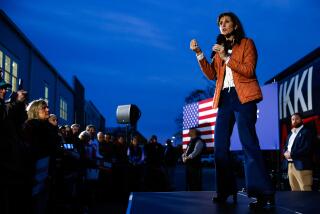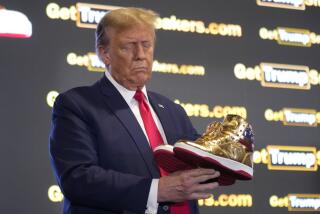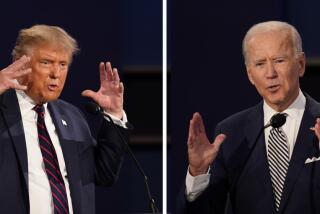Column: Who is Hope Hicks, anyway?

The first major newspaper article about Donald Trump, in 1973, described him as surrounded by “slinky fashion models.” If you count former fashion models, he still is. There’s his wife, Melania, who started modeling at 5 and eventually landed on the cover of Vogue. There’s his daughter Ivanka, who walked various runways. Kristin Anderson, Temple Taggart McDowell, Ninni Laaksonen and Karena Virginia, some of the 20 women who have accused Trump of sexual harassment and assault, were once models. Even United Nations ambassador Nikki Haley and advisor Kellyanne Conway have beauty-pageant experience.
But it’s Hope Hicks, the White House director of communications, who’s most often referred to as a “former model.” That’s not wrong: Hicks, now 29, did indeed appear in Ralph Lauren ads before going on to model clothing from the Ivanka Trump Collection, including the zipper-trim pleated sheath in form-fitting polyester/rayon/spandex ($134, Dillard’s).
Modeling is not, however, Hicks’ chief qualification for her job with Trump. She’s a publicist to the bone. By the time she was photographed in that sheath, she had already trained in a fierce Manhattan PR shop. Her first job with the Trump Organization was to expand Ivanka Trump’s brand and promote Trump’s resorts. In her mid-20s, she already had an office on the 25th floor of Trump Tower. Then one day in 2015, as Hicks told New York magazine, “Mr. Trump looked at me and said, ‘I’m thinking about running for president, and you’re going to be my press secretary.’”
Press secretary. Trump’s formal language belied what he knew well after a lifetime of litigation, depravity and scandal. Anyone who did communications for him would have to do more than stand at a podium. She’d have to be a human manganese steel plate built to obstruct anything that came for him: attacks, allegations, lawyers, journalists — and even justice.
Hicks didn’t just drift into her first PR job as some in the sheath set are known to do. Instead, she’s to the manner born, third generation in a family of special-forces flacks. Her grandfather, Paul Hicks Jr., was a lifer at Texaco, eventually running public relations and advertising there. During his tenure, Texaco went bankrupt — and in 1990 entered an unusual joint venture with the Soviet oil industry.
Paul Hicks III, Hope’s father, ran publicity for the NFL, blocking a labor impasse and tackling threats to the league’s antitrust exemption. He’s now managing director of the Glover Park Group, another communications firm, founded by Democratic operatives, which specializes in — among other things — crisis management and “Complex Situations.”
So complex situations are the Hicks family business. Moreover, when it comes to protecting clients in chronic crisis, she was trained by the best: Matthew Hiltzik, who introduced her to the Trumps. And Hiltzik made his bones as chief publicist for, wait for it, Harvey Weinstein and Miramax. Hiltzik knows from damage control.
Hicks might be an accomplice in the crime of the — well, let’s get ahead of ourselves.
PR at that level takes moral flexibility, callousness and charm. The flexibility (“it’s all relative”) and callousness (“who cares?”) allow you to sleep at night. But the charm is your real high card, especially when you’re whitewashing the unsavory practices or grave misdeeds of Texaco, the NFL, Harvey Weinstein and Donald Trump.
The catch is that whitewashing grave misdeeds, as Watergate showed, can tilt into a grave misdeed itself.
On Wednesday, the New York Times reported that Hope Hicks, according to former Trump legal spokesperson Mark Corallo, may have taken part in an effort to obstruct justice. To wit, Corallo plans to tell special counsel Robert S. Mueller III that Trump and Hicks co-wrote a July 2017 press release misrepresenting the purpose of a suspicious meeting a year earlier between Donald Trump Jr. and Russian government official Natalia Veselnitskaya.
The truth emerged later: Junior had been promised Hillary Clinton kompromat to get him to the meeting, but when he and others with the Trump campaign showed up, Veselnitskaya and others tried to enlist him in the cause of undoing sanctions against Russia, especially the ones that — under the Magnitsky Act — punish oligarchs responsible for human rights abuses. She seems also to have held out the possibility that, if sanctions were lifted, the Kremlin would allow Americans to adopt Russian children again.
When the story first broke, the 2016 meeting looked like a smoking gun for Trump-Russia ties — and Hicks, in Corallo’s telling, moved quickly to hide the weapon. She and Trump, it seems, decided to tell the media that the meeting was not about Clinton kompromat (which suggested collusion) or lifting sanctions on oligarchs (which suggested quid pro quo), but about adoptions, which sounded innocuous.
Corallo presciently suggested that, if Junior’s emails ever surfaced, the deception would too. But Hicks, in Corallo’s account, replied that the emails “will never get out,” according to the New York Times article. This showed Corallo that Hicks might be game to suppress Junior’s correspondence, which would arguably qualify as obstruction of justice.
A revered GOP spin doctor himself, Corallo is an old hand at managing crises. He was long known as “the master of disaster,” and he says he gets an adrenaline high superintending Republican nightmares. But maybe time has chastened him. Maybe he’s ready to stop spinning, especially if it saves his own hide. Or maybe he’s just aiming to best Hicks. In either case, Corallo is a PR man dropping a dime on one of his own, and suggesting that Hicks might be an accomplice in the crime of the — well, let’s get ahead of ourselves.
Does Hicks’ promise to keep Junior’s emails out of sight, and thus deceive the public — if she actually made that promise — rise to the level of obstruction? The answer to this question may double as a referendum on the whole thorny practice of public relations.
We know it’s a crime to lie to the FBI. We know it’s a crime to lie to Mueller. But, as Hope Hicks knows— and as her father and her father’s father knew — lying to the media is traditionally called PR.
Twitter: @page88
Follow the Opinion section on Twitter @latimesopinion or Facebook
More to Read
A cure for the common opinion
Get thought-provoking perspectives with our weekly newsletter.
You may occasionally receive promotional content from the Los Angeles Times.






